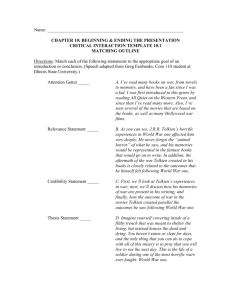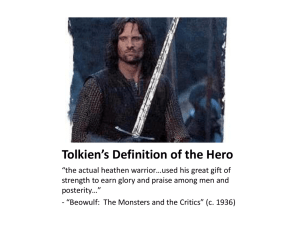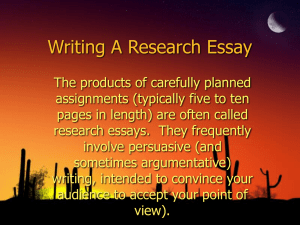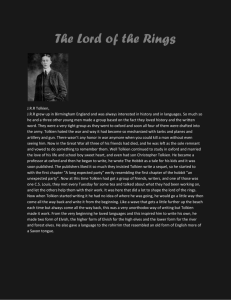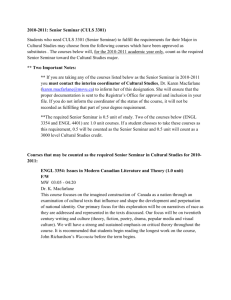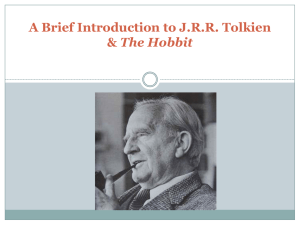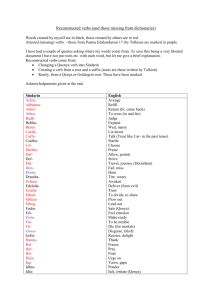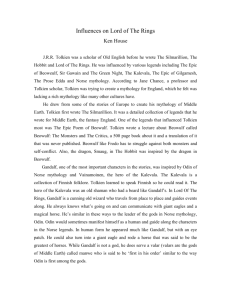Tolkien and the History of Philosophy - Senior-Learners
advertisement
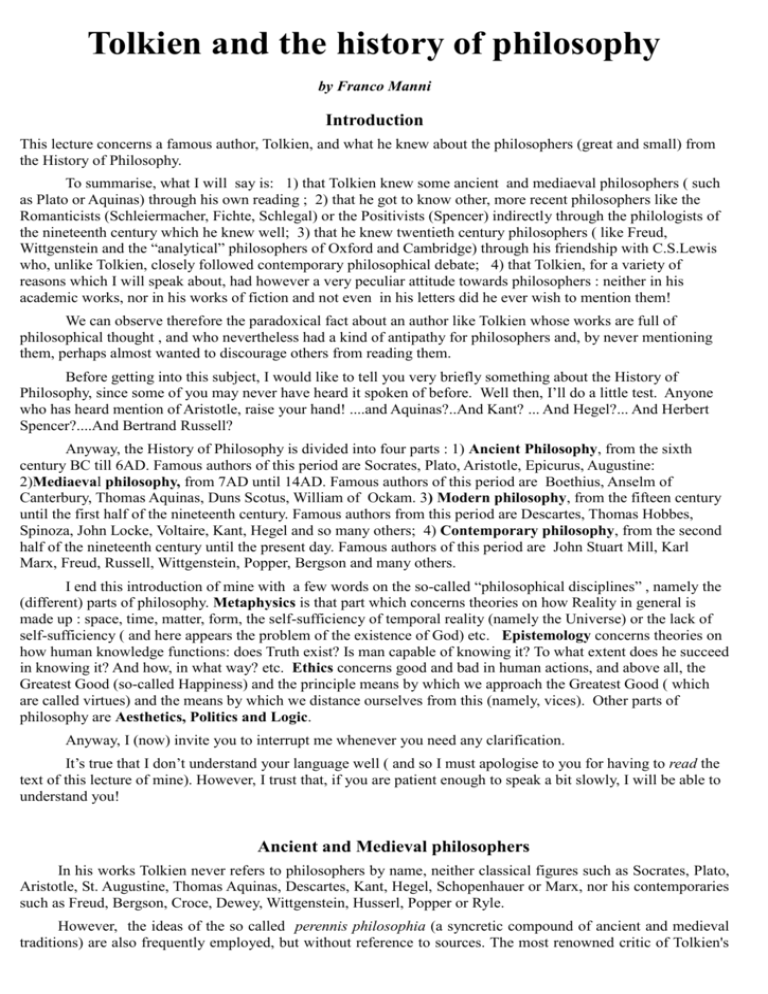
Tolkien and the history of philosophy by Franco Manni Introduction This lecture concerns a famous author, Tolkien, and what he knew about the philosophers (great and small) from the History of Philosophy. To summarise, what I will say is: 1) that Tolkien knew some ancient and mediaeval philosophers ( such as Plato or Aquinas) through his own reading ; 2) that he got to know other, more recent philosophers like the Romanticists (Schleiermacher, Fichte, Schlegal) or the Positivists (Spencer) indirectly through the philologists of the nineteenth century which he knew well; 3) that he knew twentieth century philosophers ( like Freud, Wittgenstein and the “analytical” philosophers of Oxford and Cambridge) through his friendship with C.S.Lewis who, unlike Tolkien, closely followed contemporary philosophical debate; 4) that Tolkien, for a variety of reasons which I will speak about, had however a very peculiar attitude towards philosophers : neither in his academic works, nor in his works of fiction and not even in his letters did he ever wish to mention them! We can observe therefore the paradoxical fact about an author like Tolkien whose works are full of philosophical thought , and who nevertheless had a kind of antipathy for philosophers and, by never mentioning them, perhaps almost wanted to discourage others from reading them. Before getting into this subject, I would like to tell you very briefly something about the History of Philosophy, since some of you may never have heard it spoken of before. Well then, I’ll do a little test. Anyone who has heard mention of Aristotle, raise your hand! ....and Aquinas?..And Kant? ... And Hegel?... And Herbert Spencer?....And Bertrand Russell? Anyway, the History of Philosophy is divided into four parts : 1) Ancient Philosophy, from the sixth century BC till 6AD. Famous authors of this period are Socrates, Plato, Aristotle, Epicurus, Augustine: 2)Mediaeval philosophy, from 7AD until 14AD. Famous authors of this period are Boethius, Anselm of Canterbury, Thomas Aquinas, Duns Scotus, William of Ockam. 3) Modern philosophy, from the fifteen century until the first half of the nineteenth century. Famous authors from this period are Descartes, Thomas Hobbes, Spinoza, John Locke, Voltaire, Kant, Hegel and so many others; 4) Contemporary philosophy, from the second half of the nineteenth century until the present day. Famous authors of this period are John Stuart Mill, Karl Marx, Freud, Russell, Wittgenstein, Popper, Bergson and many others. I end this introduction of mine with a few words on the so-called “philosophical disciplines” , namely the (different) parts of philosophy. Metaphysics is that part which concerns theories on how Reality in general is made up : space, time, matter, form, the self-sufficiency of temporal reality (namely the Universe) or the lack of self-sufficiency ( and here appears the problem of the existence of God) etc. Epistemology concerns theories on how human knowledge functions: does Truth exist? Is man capable of knowing it? To what extent does he succeed in knowing it? And how, in what way? etc. Ethics concerns good and bad in human actions, and above all, the Greatest Good (so-called Happiness) and the principle means by which we approach the Greatest Good ( which are called virtues) and the means by which we distance ourselves from this (namely, vices). Other parts of philosophy are Aesthetics, Politics and Logic. Anyway, I (now) invite you to interrupt me whenever you need any clarification. It’s true that I don’t understand your language well ( and so I must apologise to you for having to read the text of this lecture of mine). However, I trust that, if you are patient enough to speak a bit slowly, I will be able to understand you! Ancient and Medieval philosophers In his works Tolkien never refers to philosophers by name, neither classical figures such as Socrates, Plato, Aristotle, St. Augustine, Thomas Aquinas, Descartes, Kant, Hegel, Schopenhauer or Marx, nor his contemporaries such as Freud, Bergson, Croce, Dewey, Wittgenstein, Husserl, Popper or Ryle. However, the ideas of the so called perennis philosophia (a syncretic compound of ancient and medieval traditions) are also frequently employed, but without reference to sources. The most renowned critic of Tolkien's works, Tom Shippey, thinks that Tolkien did not mention philosophers like Plato, Boethius and others – in spite of his knowledge of them – because of his anticlassicistic bias, and, moreover because – since he wanted to bring the native English literature out – he could not find English philosophers before Chaucer's times. A clear example may be found in Note 8 of the self-commentary Tolkien made on Athrabeth Finrod ah Andreth (The Debate of Finrod and Andreth); the note discusses “desire” and distinguishes three kinds: “natural” desire which is shared by all members of a species, “personal” desire (“the feeling of the lack of something, the force of which primarily concerns oneself, and which may have little or no reference to the general fitness of things”) and “illusionary” desire, which obstructs the understanding that things are not as they should be and leads to the delusion that they are as one would wish them to be1. This distinction is the same made by Thomas Aquinas in an article in Summa Theologiae, a work which Carpenter says was present on Lewis’s bookshelf during the Inklings’ evening meetings2 and which Claudio Testi tells me that he knows Tolkien to have possessed. Further references to ancient and medieval philosophers have been pointed out by Tolkien scholars: Plato, Augustine, Boethius. Plato : on 27 February 1913 Tolkien had the First Public Examination for the Honour School of Latin and Greek Literature; on Plato, his choice of two of the Gorgias, Protagoras and Phaedo. The Hungarian critic Gergely Nagy parallels Plato and Tolkien in using “myths” to tell philosophical truths; in using the metaphor of Light, Plato with the Sun (that is the Idea of Good, in the Republic ), Tolkien in the beginning of the Silmarillion. And the American critic Gregory Bassham said : “Tolkien's repeated use of the term "demi-urgic" to describe the creative/shaping activity of the Valar was borrowed from Plato's Timaeus; the island of Numenor is based on Plato's story of Atlantis in Critias; the One Ring is based on Gyges's ring in Republic, the reincarnation of the Elves was likely to be borrowed from Plato's Phaedo”. Personally, I think that the main idea of Plato's Gorgias (“it is better to suffer an injustice than to do it”) founds the main Tolkien's idea on the use of the One Ring: “it is better to suffer deep pains and face deadly dangers not using the One Ring, than to win the war using it”. Platonic themes are present in Tolkien's writings not intended for publication, such as Laws and Customs among the Eldar and as Dialogue between Elf Finrod and Wise-woman Andreth . And here he discusses traditional anthropological and theological themes of body and soul and God’s plan for these; death for him is always the “severance” of the two “components”, which should remain united. The Elf Finrod says to Wisewoman Andreth: do you not think that the separation of soul and body could be experienced as a liberation, as a returning home?; and Andreth replies: no, we do not think so because this would be to disparage the body and is a thought of Darkness, for in the incarnate it is unnatural. As the American critic Ralph C. Wood writes, this is a “radical non-Platonic turn” , because Plato thought that Soul is good, Body is evil, and the unity of the two is unnatural, a sort of punishment for human sins. And Italian critic Claudio Testi, too, writes: philosophically “approximately one could say that it seems to be an Aristotelian element in a Platonic context”, because Aristotle thought that Soul and Body were not two “things” but just two “aspects” of the same thing, the individual person, an that the unity of the two is fully natural. The Australian critic Damien Casey as well: theologically Tolkien is aware that the heart of Christianity is the incarnation, notwithstanding the atrophy of this heritage in the Platonic tradition. Although the original Jewish/Christian message is both non-Platonic and in some respects anti-Platonic, it has for many centuries been spread widely by means of Platonic categories. Tolkien is, however, a Christian of the 20th century, a century in which theology and Christian spirituality have strongly criticized the fundamental category of Platonism, so-called “dualism” between Soul and Body. And this was because, notes the Polish critic Christopher Garbowski, “a general philosophical movement” had influenced Tolkien: in this the value accorded to psychosomatic phenomena had made obsolete a material conception of the separate “soul”, thus permitting a return to biblical monism, that is unity between Soul and Body. Now I have not the time for speaking of the research made by several critics and by me as well about Tolkien's reading of the works of two important Medieval philosophers, Augustine and Boethius. Is is sufficient, here, that there is a widespread agreement among the critics in saying that Tolkien borrowed from them two major philosophical themes of The Lord of the Rings: the conception of Evil as “nothingness” (in Sauron and in the One Ring) and the conception of Providence (in the events of the plot which seem bad and unfortunate at first , whereas at last the appear to be meant and ordered for a Major Final Good). 1 2 J.R.R. Tolkien, The Morgoth's Ring, HarperCollins Publishers, London, 1994, p. 343. See Chapter 3 in Humphrey Carpenter, The Inklings, George Allen & Unwin, London, 1978. Modern and Contemporary philosophers An interesting path for investigation on Tolkien's philosophical sources is Arthur Schopenauer (he was a German philosopher of the XIX century): 1) the importance of Music in revealing the hidden structure of the world, 2) and the idea of Art as both an “escape” and a “restore” from the corrupted world we have to live in. In my opinion, Tolkien had a knowledge of the philosophers of the XIX century through the philologists of the same century he studied and admired: two years ago at Modena I gave a lot of documentation on eminent philologists of the XIX century who have had inputs and inspirations by philosophers. Philologists who greatly influenced Tolkien (think of Grundtvig, Grimm, Ker). And also: if they have had those inputs, then Tolkien similarly – since he was not a sola avis amid philological tradition - could have had, whether or not he made them explicit. For example the philologist Ulrich von Wilamowitz writes that without philosophers Vico and Herder the researches on languages' origins and the comparative analysis of parallel phenomenons in humankind were not possible, and these were fundamental ideas in Tolkien's intellectual training. Tolkien and Collingwood : though he made no explicit references, Tolkien probably knew the XX century philosopher Robin G. Collingwood; they were in the same places at similar times (both Fellows at Pembroke College), and the latter was well known in academia and outside for his writings on the philosophy of history and his specific historical research regarding Roman Britain. Collingwood’s most important work is The Idea of History (1946); its central idea is that of “re-enactment”: historical thought (not only on the part of professional historians, but everyone) consists of re-living the thoughts of people from the past. This idea of re-living inspired the two “time travel” novels which Tolkien left unfinished: The Lost Road and The Notion Club Papers .. I note that in his book Philosophy of Enchantment (one section of which is entitled On the Fairy Tales: ), written in the same years when Tolkien was preparing his lecture On the Fairy Stories, Collingwood deals with topics as: 1) the geographic and historical diffusion of the fairy tales, 2) their relation to “archetypes”, 3) their function towards the adult people rather than the children. All themes which in that lecture Tolkien also focused on. The word “philosophy” (almost) omitted in published writings Moreover, Tolkien never uses the word “philosophy” in his fiction, and amongst other published works only thrice in the lecture On Fairy Stories and thrice in the lecture on Beowulf. Thereafter this lexical ostracism – consciously wished for, I think - continues into Tolkien's scholars: in the two massive, erudite and up-to-date “Tolkien encyclopedias” by Drout and by Scull & Hammond there is no place - in the midst of hundreds of others - for the entry Philosophy . With regard to writings not intended for publication, this word appears a few times in his Letters, usually as a synonym for “religion” or with the meaning of generalized “theory”. The “home” of philosophy is, according to him, “in ancient Greece” (and not in Germany, which he considered “home” of philology). In the aborted Tolkien's novel The Notion Club Papers the word “philosophy” appears twice: once in reference to the character Rupert Dolbear (who is also interested in psychoanalysis and often falls asleep during discussions) and once in reference to the character Michael Ramer (a philologist alter-ego of Tolkien), who says that he is not a philosopher, but rather an “experimenter”. These occurrences (or, better, non-occurrences) of the names of philosophers or of the word “philosophy” bring to mind the most renowned biography of Tolkien written by Humphrey Carpenter. In this book Carpenter gives a reconstruction of a typical Inklings’ session (the Inklings were a group of friends, all intellectuals and all Christians, who met regularly in Oxford during the Thirties and the Forties under the leadership of Clive S. Lewis, and one of its most assiduous members was Tolkien). When they are together, the friends talk of many things: the war under way, LotR, the philosophy of history, literary criticism, Shakespeare, religion, ethics. But when they refer to thinkers by name, they do so polemically, disparaging “contemporary thought”. These occurrences (or, better, non-occurrences) of the names of philosophers or of the word “philosophy”also make me think of Tom Shippey – an intellectual often identified with his hero Tolkien – who says he knows nothing of philosophy, but also demonstrates a certain (latent) polemical attitude towards it, calling philologists “tough minded” and philosophers “tender minded”. Perhaps both Tolkien and Shippey were thinking of, on one hand, the abstruse and often essentially empty philosophy of 19th-century German idealism and 20thcentury French and German existentialism and, on the other, the differently abstruse and differently empty “Oxbridge Analytical Philosophy” which was already strong before the Second World War and afterwards dominant in the English-speaking academic world. Thus, in Tolkien we find respect (though not declared love) for ancient and medieval philosophy, together with scepticism or at least lack of interest regarding modern and contemporary philosophy. Tolkien as “nationalist”, philologist and friend of the philosopher C.S. Lewis After my researches, my opinion is that Tolkien had not significant influences from the philosophers of his times: neither from those ones of the Oxford Idealism ( Smith, Carritt, Bradley, and others), nor with Oxbridge Realists and Logical Positivists (Russell, Moore, Wittgenstein, Ryle, and others). I agree with Shippey when he says: “philosophy - why does Tolkien not mention it? I suppose I can only say that unlike Lewis he never took the philosophy part of the Oxford Classics course, so maybe he felt that he was professionally ill-equipped … Oxford is always full of philosophers. Maybe he felt that that was Lewis's business. Or he could just have decided to keep his thoughts to himself”, and I agree with Shippey when he wrote me: “Tolkien may well have had an adversarial relationship with the Oxford philosophers of his time (as CS Lewis did), and he may also have not wished to engage in any kind of argument with them, since he had not had any training in philosophy (in this case, unlike Lewis). He may have consciously decided to abstain from an argument he knew he could not win.” Shippey said on Collingwood: “Tolkien was often annoyed by people who shared his interests, but did not see them in quite the same way that he did.”, but Shippey himself in Roots and Branches documented a lot of direct Wagner's influences on Tolkien, even if Wagner was hardly mentioned . Why? Tolkien erases the references! Such as when he erased the name of C. G. Jung from the first draft of On the Fairy Stories lecture … a question of personality! How was this personality? I try to give some answers. He was a “nationalist”. Shippey wrote me: “but will just say that Tolkien’s conviction that English tradition had been slighted, marginalized, and largely lost, is no more than the truth..... as for not naming philosophers he did read and know, Boethius, Plato etc., well, maybe this is part of his anti-Classical bias. We know that Tolkien read Latin very well and Greek quite well, but he rarely mentions these either, though when you look, the connections are often quite clear. But Tolkien always felt he was a spokesman for the neglected native tradition - not that England produced any early native philosophers, other than King Alfred as an interpreter of Boethius”. Moreover Tolkien was a philologist, but: he was a Germanistic philologist (the Germanistic philology studies languages as German, English, Norvegian, Danish etc) not a Classicist philologist (the Classicist philology studies old Greek and Latin) . Tolkien wrote: “Greek Gods are timeless and do not know or fear death. Such beliefs may hold promise of a profounder thought, so that the Greeks could make philosophy, but the Germanic North created specially the hero.”. So Tolkien – as a scholar of Germanistic Philology - could more easily focus (and make bibliographical references, quotations, etc.) on heroism and not on philosophy. He was an Inkling and Christian philologist who had to defend his point of view either in the University Departments and in literary criticism from the fashionable Literati who were both Modernist in their poetics and atheist in their philosophy. Tolkien was a Christian philologist, when not only the Literati, but also most of philosophers of his times were atheist . And his mode of apologetics (different from Lewis's mode) was – perhaps! - to not surrender to the enemy by the tactics of not naming him. If not, how to explain Tolkien mentioning the not so important Dawson – in On the fairy Stories - and not much more important Spengler and Toynbee (all of them philosophers of history, but only the first a committed Christian)? Finally, I present the hypothesis that C. S. Lewis did influence somehow Tolkien during the 20 years of their closer friendship. If this is true - at least in part - it would be worthy to know something on Lewis as a philosopher, a research which is still to be done. In his letters Lewis makes references to almost all the classic authors of the history of philosophy . But, more specifically, he was a sort of an Aristotelian, as he stated explicitly and repeatedly. Thus, Lewis's philosophers were not his contemporaries. In Lewis's letters there are many references to Aquinas, but no references to L. Wittgenstein and B. Russell and A. J. Ayer, almost nothing referred to Gilbert Ryle, nothing on Dewey; for instance, writing on the death of a Oxford philosopher, J. A. Smith, Lewis writes that he was an honest man but not a believer, and says nothing on his philosophical thought. Some conclusions Summing up what I said before on Tolkien and the History of Philosophy: a) I am quite sure he read (at least to some extent) Plato, Aristotle, Augustine, Boethius, Aquinas; b) I present the hypothesis that he read (at least till some extent) Schopenauer, Collingwood, Jung; c) I am sure that the ideas of Romanticist philosophers such as Schlegel, Herder, Schleiermacher, Fichte, Schelling and Hegel and the ideas of Positivist philosophers such as Comte and Spencer did arrive to Tolkien, however indirectly, through the great XIX century philologists who knew – sometimes well – those XIX century philosophers; d) I think that Tolkien had notice – from Lewis and other scholars of his acquaintance - of the ideas of the philosophers of his times, either the Idealists, and the Logical Positivists, and Existentialists, and I think that Tolkien was not interested in them as well as Lewis and the other Inklings were not! So, indeed, I was looking for “sources” (in this case, philosophical ones). At the International Conference held at Modena in 2010 (Tolkien and Philosophy) Shippey quoted Tolkien's metaphor of the 'soup'. Tolkien in his lecture On the Fairy Stories wrote the a literary work (say a poem or a novel) is similar to a soup or stew: you have to taste and enjoy the final output and not to look for the single ox's bones which gave it the flavour. In the same way to read and enjoy a literary work without looking for its sources, its predecessors etc. And Shippey said “In this metaphor Tolkien was rejecting the utility of source-study, and as he often did, overstating his case to make a point. Differently from Tolkien, I think that source-study can be useful, and that philosophers were no doubt among Tolkien’s sources. But Tolkien was right in that it is very difficult to analyse soup into its component parts. I do agree with Shippey in saying it is very difficult!
